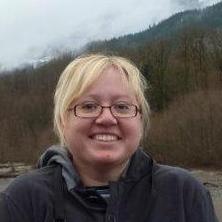This month we feature comments by two of the International Committee 2016 Scholarship awardees:
Annie Pohlman
Annie Pohlman (University of Queensland, Brisbane, Australia)
I thank that Oral History Association’s international committee very much for the international scholarship which allowed me to take part in the Annual Meeting in Long Beach, California, on 12–16 October 2016. I am an Australian scholar based at the University of Queensland (Brisbane) who focuses on oral history in Indonesia and Timor Leste and it was a wonderful opportunity to take part for the first time in the OHA in north America. I particularly wish to thank Leslie McCartney and the rest of the OHA’s international committee, as well as Gayle Knight, who so kindly organised the scholarships.
The paper that I presented at the 2016 OHA conference reflected on the role that I played preparing evidence for the recent International People’s Tribunal for 1965. The 1965 Tribunal – as with all People’s Tribunals – was an attempt to achieve some measure of symbolic justice for crimes against humanity committed in Indonesia in 1965-1966. During this time, the Indonesian army wiped out the Left from Indonesia: more than half a million people were killed and another 1.5 million rounded up and detained in what were essentially concentration camps, where many died from torture, starvation and forced labour. The People’s Tribunal, while it has no jurisdiction and is in no way binding, collected and presented evidence of numerous forms of crimes against humanity at a special people’s forum, held in the Netherlands in November last year. The judgement, handed down in July this year, found the Indonesian state guilty of crimes against humanity and genocide.
My role in this tribunal was to prepare evidence of a range of sexual and gender-based crimes for the Prosecutor. All of this evidence was based on the oral histories of mainly women survivors, collected by myself and a number of human rights organisations based in Indonesia. The process of turning these oral histories into evidence was a complex one: the Prosecutor required the kind of detailed accounts naming individuals and crimes in a way that is rarely found in life history-style narratives.
I presented this paper on a panel together with Erin Jessee, an oral historian and close friend whose work focuses mainly on Rwanda and Uganda. The OHA conference was also an excellent opportunity for Erin and I to continue our collaboration: in previous years, we’ve edited a special edition on ‘confronting mass atrocities’ for the Oral History Forum d’histoire orale, and we are now co-authoring a manuscript. The book (which is only in the early stages at the moment) will examine forms of symbolic violence during genocide and mass atrocities. We will compare cases of this violence in four case studies: during mass violence in Rwanda, Uganda, Indonesia and Timor Leste. Erin and I were very grateful to have the time during the OHA conference to confer and work on this project. I look forward to attending many more OHA events!
Meera Anna Oommen (University of Technology, Sydney & Dakshin Foundation, Bangalore)
A generous scholarship from the OHA enabled me to attend my first oral history meeting at Long Beach. At the conference I presented a paper that looks at the evolution of conflict between people and wildlife on a forest agriculture fringe in a mountain landscape in Kerala, India. I used oral histories to explore a recent environmental history of the region where migrant settlers practicing marginal agriculture oppose statist conservation through retaliatory killings of charismatic species and through everyday acts of resistance. The testimonies of first and second generation settlers highlight the cumulative impact of two traumas which impacted this community, and dominate settler remembrances: famine and impoverishment during World War II which catalysed their dislocation from their native villages in the plains, followed by protracted conflict with crop-raiding elephants in their new home in the hills. The study shows that contemporary conflict is a complex ongoing narrative characterized and fuelled by the persistence of memory.
For a researcher who primarily works in the field of conservation science, this meeting not only provided me an opportunity to present my own work to a broader community, I also received valuable inputs from a range of scholars and practitioners working in different fields. In addition to my presentation, I was also given an opportunity to be participate in an OHA Roundtable on ‘Telling Environmental Stories’ (aimed at an upcoming volume of the same title) comprising other co-authors including Katie Holmes, Annie Valk, Heather Goodall and Deb Anderson. The questions and suggestions from fellow panelists and other participants have been extremely beneficial for the manuscript that I am preparing for this volume. From the many sessions that I attended, I learnt a great deal and came away with exciting new ideas and even a few opportunities for future collaborative work with fellow attendees.
